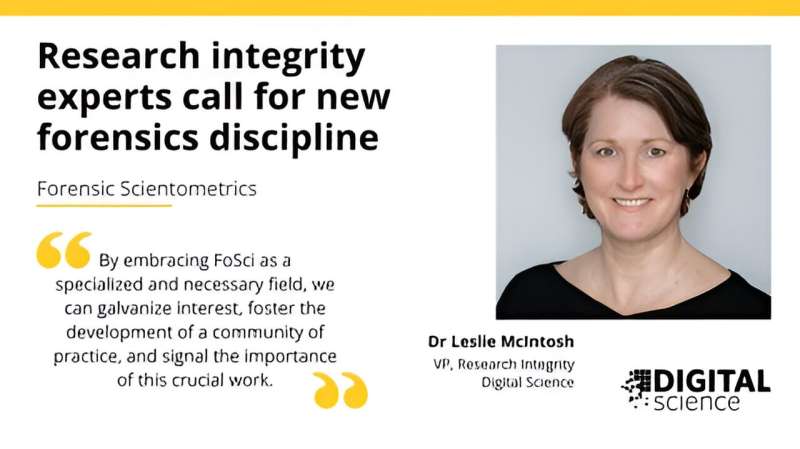This article has been reviewed according to Science X's editorial process and policies. Editors have highlighted the following attributes while ensuring the content's credibility:
fact-checked
preprint
proofread
Forensic Scientometrics—an emerging discipline to protect the scholarly record

A new field of forensics is being proposed by research integrity experts to recognize their investigations into unscrupulous research behavior and misuse of scholarship: Forensic Scientometrics.
In a preprint article available now on arXiv and in a new guest article in The Scholarly Kitchen, Dr. Leslie McIntosh (Vice President Research Integrity, Digital Science) and Cynthia Hudson Vitale (Director, Science Policy and Scholarship, Association of Research Libraries) have proposed the field of Forensic Scientometrics (FoSci) to recognize the application of data science to uncover research integrity issues.
"In a growing computational research and open science world, misuse and abuse of research have evolved. But so have methods for identifying and analyzing misconduct. This new reality warrants its own applied academic field," Dr. McIntosh says.
"We recognize the increasing importance of defining this field of inquiry for ourselves and our colleagues to uphold trust in science."
Dr. McIntosh says FoSci combines elements of forensic science with scientometrics, which is the study of measuring and analyzing scientific literature.
"In this context, 'forensic' refers to the use of scientific methods and techniques to investigate questions related to authenticity and integrity within the realm of scientific research," she says.
Creating a new field of Forensic Scientometrics will help to address the current siloed approach to upholding research integrity, ensuring that efforts to safeguard the integrity of science and scholarly communications will be coordinated and comprehensive, Dr. McIntosh and Hudson Vitale argue.
"Currently, efforts to uphold the integrity of scientific activities are dispersed across various stakeholders, including researchers, librarians, independent scholars, research institutions, journalists, government officials, funders, and lawyers. These efforts, while valuable, are often siloed within their respective disciplines, leading to a fragmented approach to addressing lapses in research integrity," Dr. McIntosh says.
"By embracing FoSci as a specialized and necessary field, we can galvanize interest, foster the development of a community of practice, and signal the importance of this crucial work," she says.
More information: Leslie D. McIntosh et al, Forensic Scientometrics—An emerging discipline to protect the scholarly record, arXiv (2024). arxiv.org/abs/2404.00478
Journal information: arXiv
Provided by Digital Science and Research Solutions Ltd





















